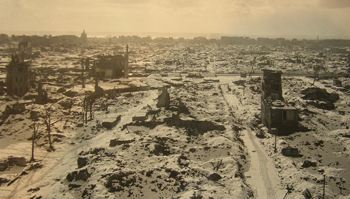Remember the French civilians who sacrificed their lives for freedom
Release Date 06 June 2014

As world leaders gather in France to commemorate the brave soldiers who lost their lives during the D-Day landings, the work of a University of Reading historian has led the call to remember the forgotten casualties of that fateful day, French civilians.
In a new book entitled La France sous les bombes allies (The French Under Allied Bombardment), Professor Andrew Knapp questions the validity and effectiveness of the Allied bombing campaign up to and during the liberation of France.
Andrew Knapp, history professor at the University of Reading, said: "In the first 24 hours of D-Day approximately 2,500 French civilians died. That number matches the losses suffered by the Allied military. Over 57,000 French civilians died under Allied bombs during World War Two, a figure close to the 60,500 casualties suffered by the British as a result of Luftwaffe bombing over the same period. A key aim of the book has been to acknowledge the suffering of the survivors - and to give them a voice before it is too late."
Almost half of Bomber Command's brave airmen were killed in action. Their missions, their commanders argued, would help win the war more quickly. But how necessary was this Allied ‘blitz'?
Professor Knapp continued: "On 21 January 1944 most of the Allied top brass of the Normandy campaign and beyond met to plan ‘Operation Overlord'. A key aim was ‘to interfere with enemy communications in North-West Europe until there arose a state of paralysis on the railways, as requested by General Montgomery.' In addition ‘the flattening out of important centres of road communication, such as Lisieux, Falaise, Caen, Saint-Lô, and Carentan' was also central to the plan.
"It did not work as well as hoped. The rail network was damaged but not paralysed. The damage slowed down German reinforcements, and in some cases forced them to de-train earlier, making them arrive late and tired at the front; but it did not stop them completely. The attacks on road junctions achieved practically nothing. The German forces by-passed the wrecked towns with little difficulty, often on roads offering better camouflage from Allied aircraft."
Professor Knapp's research has led to him being invited by the French Government to the first ever commemoration of French civilians killed during the Allied bombings after the D-Day landings.
"For the French people, air raids entailed both immediate suffering and a longer-term moral dilemma: that of accepting death and destruction at the hands of Allies whose military action was necessary to end the German occupation. As we remember the bravery of the Allied troops and the crews of Bomber Command, we should not forget the thousands of French civilians who lost their lives for freedom."
